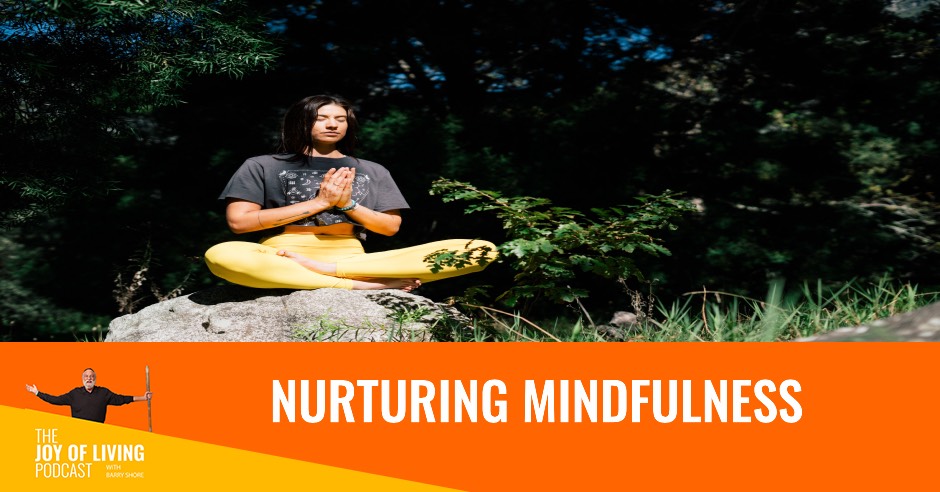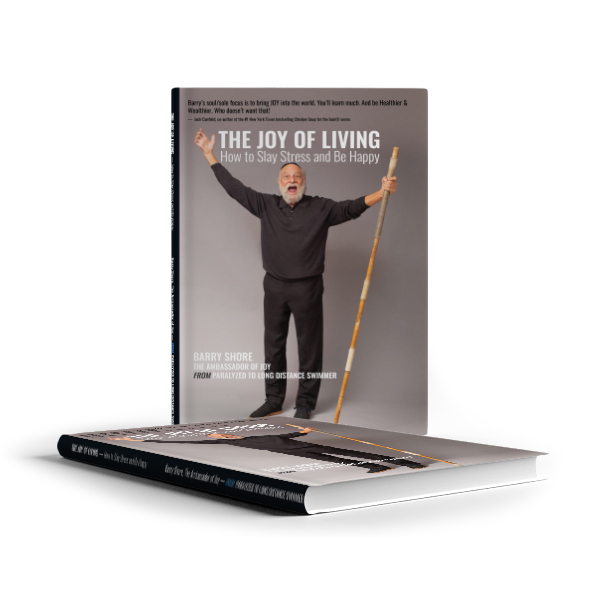Share This Episode

Nurturing Mindfulness, Preventing Burnout, and Embracing Peak Performance: A Conversation with Larisa
Join us in this enlightening episode of ‘The Joy of Living’ as host Barry Shore engages in captivating conversations with guest Larisa. In this thought-provoking segment, explore the transformative power of mindfulness, the importance of preventing burnout through self-care, and the keys to achieving peak performance while nurturing your unique strengths. Discover how to redefine laziness as a conscious choice, and learn to address deeper beliefs that might hinder your progress. Larisa’s insights and practical tips inspire a journey towards greater self-awareness, personal growth, and embracing the joy of living in every moment.
Listen Here (click here to watch episode)
Show Notes:
This episode is brought to you by BetterHelp.
Give online therapy a try at betterhelp.com/JOYOFLIVING
and get on your way to being your best self.
[10.35] Mindfulness
In this segment, Larissa discusses the practice of mindfulness and how it can bring more joy into our lives. Mindfulness is all about focusing on the present moment without judging ourselves. Larissa shares practical ways to incorporate mindfulness into our daily routine to experience the joy of living.
- Definition of Mindfulness: Mindfulness means paying attention to what’s happening right now, on purpose, without making any judgments.
- Making Mindfulness a Daily Habit: Larissa explains how we can bring mindfulness into our everyday life. It’s about being fully present in the moment, allowing us to truly enjoy life.
- Slowing Down: One practical tip for mindfulness is to slow down. This might seem hard because we often think being busy is better. But it’s important to permit ourselves to take it easy.
- Challenging Beliefs: Many of us believe that slowing down is lazy or wrong. We often feel the pressure to always be busy and productive. Larissa encourages us to challenge these beliefs.
- Starting the Day Right: Larissa shares her routine that sets a mindful tone for the day. Her routine includes meditation, gratitude, and focusing on her purpose.
- Three Intentional Breaths: A simple way to begin practicing mindfulness is by taking three intentional breaths. This helps us center ourselves and become aware of the present moment.
- Curiosity and Self-Inquiry: The second step in mindfulness is curiosity. This means asking ourselves questions and exploring our thoughts and behaviors without judgment.
- Kindness and Non-Judgment: With curiosity comes kindness. It’s important to be non-judgmentally aware of our thoughts and actions. This self-compassion leads to a deeper understanding of ourselves.
ABC: Awareness, Breath, and Clarity
[24.11] Burnout
In this segment, Larissa addresses the important topic of burnout and how practicing self-care can help prevent it. She emphasizes the significance of caring for ourselves and how it ultimately enables us to be our best selves. Larissa also talks about challenging the belief that self-care is selfish and shares insights on creating a positive impact while avoiding burnout.
- Self-Care for Burnout Prevention: Larissa discusses the practice of self-care as a means to prevent burnout. Taking care of ourselves is not selfish but necessary for our well-being.
- Empowerment Through Self-Care: When we prioritize self-care, we are better able to show up as the best versions of ourselves. This empowers us to make a positive impact in our lives and the lives of others.
- Making a Positive Impact: Larissa believes that each person has a unique purpose to make a positive difference in the world. Recognizing our strengths and gifts is essential for fulfilling this purpose.
- Challenging Deep-Seated Beliefs: Sometimes, we believe others are more important than us. Larissa encourages us to challenge these beliefs and recognize our own worth.
- Setting Boundaries: Burnout often stems from not having boundaries and constantly overcommitting. Larissa emphasizes the importance of setting limits to maintain a healthy balance.
- Embracing Imperfection: Trying to be perfect in every aspect of life can lead to burnout. Larissa reminds us that it’s okay to make mistakes and be human.
[30.00] Self-Care
In this segment, Larissa delves into the concept of self-care, highlighting its importance for our mental, physical, and spiritual health. She explains that self-care can vary from person to person and provides insights on identifying and taking action to fulfill our needs. Larissa also discusses the balance between self-care and caring for others and the challenge of making choices amidst numerous options.
- Defining Self-Care: Self-care involves taking deliberate actions to maintain or enhance our mental, physical, and spiritual well-being.
- Personalized Approach: Self-care looks different for everyone because each person has unique needs and preferences when it comes to nurturing themselves.
- Clarity on Needs: The first step to effective self-care is gaining clarity about what we truly need. Many people struggle with this step, not knowing what will truly benefit them.
- Balancing Self and Others: Larissa emphasizes that self-care doesn’t mean neglecting others. It’s possible to care for ourselves and others simultaneously.
- Overcoming Choices Overload: When faced with numerous self-care choices, people often become overwhelmed and end up not taking any action—a phenomenon known as “Analysis Paralysis.”
- The Power of Attention: Larissa underscores the importance of paying attention to our own needs. Being aware of what we require is key to practicing meaningful self-care.
- Personal Responsibility: While a doctor might offer advice, it’s ultimately up to us to pay attention to our well-being and take proactive steps toward self-care.
[37.38] Peak Performance
In this segment, Larissa explores the concept of peak performance and how it varies for each individual. She compares it to the personalized nature of self-care, highlighting that peak performance means different things to different people. Larissa also provides insights on identifying strengths, assessing important areas of life, and maintaining peak performance sustainably.
- Individualized Nature: Similar to self-care, peak performance is a unique journey for everyone. What constitutes peak performance for a professional athlete might differ from that of a university professor.
- Leveraging Strengths: Achieving peak performance begins with understanding our strengths. Recognizing what we excel at is a foundational step.
- Identifying Key Areas: Larissa emphasizes the importance of considering various aspects of our lives when aiming for peak performance. This involves looking at what matters most to us.
- Strategic Approach: Once we’ve gained clarity on our strengths and important areas, we can then pursue peak performance in a purposeful and strategic manner.
- Sustaining Success: Larissa points out that people can often engage in unproductive activities for extended periods. True peak performance requires aligning our actions with our goals and values.
- Overcoming Limiting Beliefs: While we may understand the importance of self-care and peak performance, underlying beliefs can still hinder our progress. Larissa suggests examining these beliefs to overcome potential roadblocks.
- The Power of Questioning: Larissa proposes a practical exercise of writing down three personal beliefs and exploring the reasons behind them. This self-inquiry can unveil insights that promote growth.
[44.57] Lazy
In this segment, Larissa offers a fresh perspective on laziness, redefining it as a conscious choice to abstain from an action. She encourages us to examine how we might sometimes hinder our progress and discusses the significance of addressing deeper beliefs that prevent us from taking action. Larissa also emphasizes the power of forgiveness and celebrating our awareness for personal growth.
- Reframing Laziness: Larissa introduces a different way of looking at laziness – it’s not just about being inactive, but rather consciously choosing not to do something.
- Identifying Self-Sabotage: Sometimes, we unintentionally obstruct our own path to progress. Larissa prompts us to recognize these instances where we hinder ourselves.
- Exploring Deeper Beliefs: When we know what we should do but still don’t, underlying beliefs might be at play. Larissa encourages us to address and transform these beliefs.
- Forgiving Ourselves: A crucial aspect of personal growth is self-forgiveness. Larissa shares that forgiving ourselves for past inaction or mistakes is essential for moving forward.
- Momentary Truth: Larissa suggests that our perceptions and beliefs are true and real only in the present moment. This notion allows for flexibility and growth.
- Celebrating Awareness: The journey toward self-improvement is anchored in awareness. Larissa emphasizes that being aware of our thoughts and actions empowers us to become our best selves.
What’s your most fervent desire?
I desire to allow everyone to feel better because of my existence. Not because of it but because I leave everyone feeling better than they did before.
Important Links:
About Larisa Harrington
Meet Larisa Harrington, PCC, C-IAYT, a seasoned Coach, Consultant, Speaker and Trainer, with over two decades of experience in wellness and leadership. Larisa brings a unique blend of expertise in mindfulness, emotional intelligence, somatic trauma healing, conscious leadership, and burnout recovery & prevention, all backed by her distinguished career as a retired Air Force veteran and a certified yoga therapist.
THIS SHOW BROUGHT TO YOU BY ORGANIFI
use code LIVING for 20% off your next order

